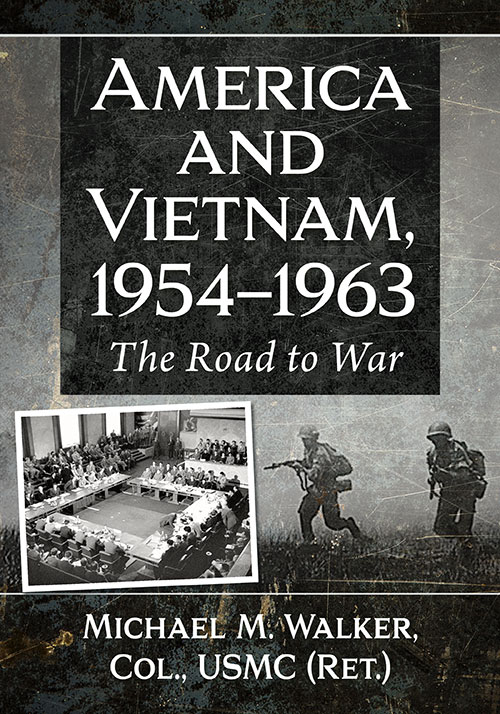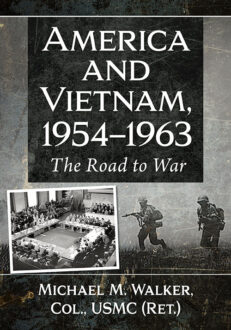America and Vietnam, 1954–1963
The Road to War
$49.95
In stock
About the Book
The conventional narrative of the Vietnam War often glosses over the decade leading up to it. Covering the years 1954–1963, this book presents a thought-provoking reexamination of the war’s long prelude—from the aftermath of French defeat at Dien Bien Phu—through Hanoi’s decision to begin reunification by force—to the assassination of South Vietnamese President Ngo Dinh Diem. Established narratives of key events are given critical reappraisal and new light is shed on neglected factors. The strategic importance of Laos is revealed as central to understanding how the war in the South developed.
About the Author(s)
Bibliographic Details
Michael M. Walker, Col., USMC (Ret.)
Format: softcover (7 x 10)
Pages: 391
Bibliographic Info: 16 photos, glossary, notes, bibliography, index
Copyright Date: 2022
pISBN: 978-1-4766-8955-5
eISBN: 978-1-4766-4751-7
Imprint: McFarland
Table of Contents
Acknowledgments vi
Abbreviations ix
Preface 1
Part I—The Path to War 9
1. Going to War in 1959 11
2. Fight for Survival in South Vietnam 28
3. The 1955 Battle for Saigon and Diem Consolidates Power 49
4. South Vietnam Under Ngo Dinh Diem in 1959 62
Part II—The Combatants 79
5. A Comparison of the Two Vietnams, 1959 81
6. South Vietnam’s Military in 1959 99
7. The People’s Army of Vietnam and the Entry of the Viet Cong 118
8. Who Were the Viet Cong? Part 1 134
9. Who Were the Viet Cong? Part 2 155
Part III—What About Laos? 169
10. The Agony of Laos 171
11. Geneva, the Battle of Nam Tha, and Hanoi’s Logistics War 192
12. End of the Laos Crisis: A Solution that Doomed the Peace 207
Part IV—How the War Went and the Fall of Diem (1959–1963) 227
13. The Vietnam War in 1959–1961 and the CIA’s Secret Wars 229
14. The Vietnam War in 1962–1963 and the Battle of Ap Bac 251
15. What Was the 1963 Buddhist Crisis? 268
16. How About a Coup? 287
17. The Murder of Diem and Its Consequences 304
Chapter Notes 319
Bibliography 359
Index 371
Book Reviews & Awards
• “Michael Walker has written a truly groundbreaking, factual, unbiased and thoroughly researched history of the key years leading up to the beginning of the American phase of the Vietnam War.”—Col. Andrew R. Finlayson, USMC (Ret), author of Killer Kane and Rice Paddy Recon
• “With this superb account of the early years of the Vietnam War, Michael Walker bolsters the growing body of research that refutes the longstanding conventional wisdom. It should be read by anyone interested in understanding how and why the United States went to war in Vietnam.”—Mark Moyar, author of Triumph Forsaken: The Vietnam War, 1954-1965
• “In a masterful and concise manner author Mike Walker has drawn together three foundational pillars that explain why the American Vietnam War took the fateful path it did. Author Walker makes plain the fact that it was the Cold War, Laos and the murder of Ngo Dinh Diem which constitute the crucial stepping-stones paving the path to war. Accordingly, this book clears away the fog that the orthodox school of Vietnam War history have so carefully created and lays bare the real terrain which, in turn, makes this book a must read for any serious scholar of that conflict.”—Dr. Geoffrey D. T. Shaw, Ph.D., author of The Lost Mandate of Heaven and director of the Alexandrian Defense Group
• “Walker’s work is significant because it presents this period largely (though not exclusively) from Hanoi’s view rather than from America’s point of view. Observing the U.S.’s path to war this way allows him to establish a unique framework, into which he maps American and South Vietnamese actions, that forms the structure of his book….Walker’s work is a solid addition to the body of scholarly work on U.S. involvement in Vietnam. It is well researched, bringing together information from an extensive set of sources, and offers fresh insights into critical events. Scholars and students of the history of warfare will appreciate the rigorous approach Walker has taken to his topic and the depth of his research, while knowledgeable readers and war history enthusiasts will appreciate that he has made information from an impressive range of sources available to them. The book is well written and highly readable. It can be enjoyed by scholars, students, or history enthusiasts, and could be a valuable supplemental text for classes on the Vietnam War.”—The Journal of Military History
• “An exceptionally well-researched and written history…outstanding…This is an informative book that answers many questions about how the United States wound up fighting in Vietnam in a much-expanded conflict. It is well worth the time to read.”—VVA Veteran
• “This is a tale that Walker ably tells.”—H-Net Reviews






